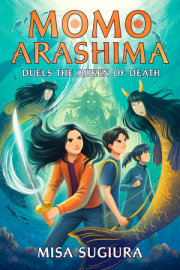Happy Birthday to Me
Niko says I should have known something was wrong from the moment he appeared in my backyard the night before my twelfth birthday. But I disagree. Because look—I can guarantee you that most people who saw what I saw that night would’ve said to themselves, I must be dreaming, or, It must be something I ate, and gone right back to bed.
And back then, I was trying really hard to be like most people.
But I’m getting ahead of myself. What happened was, I woke up to a yowl and a yippy bark. I got up and peeked out the window to see the neighbor’s cat streaking across the yard, which was not unusual—but trotting oh-so-casually after it was a fox, which was unusual. The fox stopped in the middle of the yard, sat down, and pointed its sharp, twitchy nose and bright black eyes directly at my window.
The moon was shining from somewhere above and behind me, bathing the fox in cool silver light and casting a magical glow on the entire yard. As the fox stared at me, I was seized by this strange feeling that it knew who I was. Like it knew I was watching, and it was waiting for me. And then—I swear I’m not lying—it nodded at me and patted the ground with its paw. Yes, you, it seemed to be saying. Come out here at once. I need to talk to you.
That was not just unusual. It was unbelievable. Like, literally not able to be believed. “It’s just my imagination,” I muttered to myself. I shut my eyes and tried to shake what I’d seen out of my head. I couldn’t have seen it. That was the problem with having what my teachers called an “overactive imagination”—I tended to see things that no one else could see. It hadn’t happened in a long time, and I was annoyed (and maybe a little afraid) that it was happening now. Because normal kids didn’t see things that weren’t real, and like I told you, I really wanted to be a normal kid.
I put my hand out to knock on the window. If it was a magical fox who was here for me, he’d nod again, or do something else strange and un-fox-like. If it was a regular old real fox, he’d run away. I tapped three times—tap, tap, tap—just as a cloud moved across the moon and helped break the silvery magical feeling. The fox looked startled and scampered into the shadow of a big pine tree at the edge of the yard.
Okay, whew, I thought. Regular old fox, then.
I could just barely see him huddled under the lowest branches of the pine tree, his tail covering him like a fluffy blanket. He stayed perfectly still for several minutes, and eventually I got tired of watching him and went back to bed. Like a normal person.
If I had bothered to go to the front of the house to take a look at that cloud over the moon, I might have seen why the fox had hidden so suddenly. And I would not have been able to go back to bed like a normal person, because I would have been completely terrified. Because it wasn’t really a cloud, as you may have guessed by now.
Hovering several feet in the air above the house, wearing a ragged black ball gown, black stiletto heels, and too much makeup, was a shikome—one of the death hags who serve Izanami the Destroyer, Queen of Death. The shikome’s hair hung in patches from her scalp, which was peeling off her skull. Her eyes were pure white under her false eyelashes and drawn-on eyebrows, and although her lips had caved into her toothless mouth, she’d done her best and smeared a bright red outline of lipstick around the gaping hole. When she breathed, it was with a rattling hiss that would make your skin crawl. I didn’t know it then, but she had followed that fox halfway around the world.
And she was waiting for me, too.
Mom didn’t mention my birthday at breakfast the next morning, which was odd. She forgot a lot of things, but she’d always done something special for my birthday: pancakes for breakfast, handmade jewelry, a drawing of the two of us.
“Um, are we doing anything for my birthday?” I asked her, a little annoyed.
“Oh. I—I’m sorry, Momo, I forgot all about it.” She looked more nervous than sorry. She looked like she was lying, in fact. “Maybe we can do something tomorrow.”
I should have realized right then that something was wrong. But instead I decided to believe that she was planning a surprise, and dropped the subject. I told her about the fox—without the waiting and winking part, because the whole issue with my imagination was kind of a sensitive subject between us. Still, Mom loves foxes, and I thought she’d get a kick out of knowing there had been one in the backyard. But instead of smiling with delight, or asking me reproachfully why I hadn’t woken her, she went pale.
“What did he look like?” she asked.
“I don’t know. Like a fox,” I said impatiently. “Sharp nose, bushy tail . . .”
“Where did he go?”
I shrugged. “The last I saw him, he was hiding under the pine trees.”
“Hmm.” Mom stared into the air, and her eyes grew unfocused.
“What?”
She refocused on me and bit her lip. “Nothing,” she said. “Nothing at all.” Shivering, she pulled her bathrobe more tightly around herself before sighing and leaning back in her chair, eyes closed.
I forgot about the fox. “Are you okay?”
“I’m just a little tired. I think I might go back to bed.”
She pushed herself up and left the kitchen, moving slowly, carefully, as if walking was causing her pain. As I finished getting ready for school, I wondered if I should make a doctor appointment for her. I was used to making them for myself—she wasn’t the greatest at stuff like that. But how would I convince her to go? She hated doctors, and I couldn’t remember the last time she’d gone to one. If she was sick, we probably wouldn’t be able to do anything for my birthday, I thought with some disappointment.
I glanced at the clock. I’d have to think about all of that later. I had more pressing things to worry about, like getting through the school day. I sighed and swallowed the low-key feeling of dread I always felt before going to school.
The thing is, I was not exactly what you would call well liked. Don’t get me wrong—no one actively hated me or anything. But I was pretty much at the very bottom of the trash heap known as the seventh-grade social scene. How do I know? You know these things. But if you want proof, I’ve got plenty.
For example, Kiki Weldon had recently made a list that ranked all seventy-one seventh graders at Oak Valley Middle School in order of popularity, and it had gotten printed and posted on the wall at school.
Guess who was number seventy-one.
Even worse than my rank was the fact that other low-ranked kids seemed to think that associating with me might somehow jeopardize their sweet, sweet spots in the upper sixties. So Sunita Agrawal (#65) stopped answering my calls (forget about texts—Mom didn’t let me have a cell phone). Eliza Lang (#67) rolled her eyes for all to see when she got partnered with me in Spanish class. Marina Fernandez (#68) turned her back on me when I sat down next to her at lunch. Literally no one wanted to be my friend anymore.
By the way, someone told on Kiki, and she was suspended and had to make an announcement on the PA system about how sorry she was and how wrong and cruel the list had been, etc., etc., but did that turn her into a better person? Did it lead to a kinder, gentler era where everyone in seventh grade was equally popular and nice to each other?
Hello, are you a citizen of Earth? Of course it didn’t.
And then there was last weekend at the back-to-school dance. Normally I would have avoided that dance like the pit of vipers that it was, but Ms. Pérez, my language arts and homeroom teacher, had asked me to help with the decorations, even though I wasn’t part of the student leadership class.
“It’ll be good for you to get involved in school activities,” she said. “Working together with the others will help you bond with them.” Riiight. But I knew that Mom worried about me not having friends. If I went to the dance, maybe she’d think I had friends again. Maybe it would make her happy. So even though every cell in my body was screaming at me to stay home where it was quiet and safe, I said yes.
Unfortunately, the result was a viral video of me getting splashed with a cup of punch and making one of those weird AAACK! faces—all in super-slo-mo, so the tiny yelp that actually came out of my mouth sounded more like the bellow of a charging rhinoceros. But that’s not all, folks. The real highlight came when someone pointed out a sign on my back that said, Help! I’m on fire! and I basically turned into a horror-movie monster. With a Godzilla-level roar and a face that makes Gollum look like a sweet little foster kitten, I rushed the boy who splashed me—and then tripped over my own feet and fell flat on my face. No one helped me up. But I was suspended, the school counselor recommended therapy for my “anger issues,” and Mom spent two days crying in her room.
So, yeah. Going to school felt like going into battle.
No one brought me cupcakes or wrote Happy birthday, Momo! on the whiteboard for my birthday, but I did ace a quiz on the Greek gods and a math test on exponents. (I aced all my tests because the thought of being unprepared for anything made my stomach hurt.) In language arts we watched a video about a whale whose song doesn’t match the song of any existing whale species, and it wanders the ocean all alone. You and me both, buddy, I thought. I didn’t raise my hand when Ms. Pérez had us discuss how the video made us feel, though. Keeping my mouth shut and staying under the radar was lonely, but it was the one thing I could control about my social life: if I didn’t talk, no one could make fun of what I said. If I didn’t try to make friends, no one could reject me.
After school, everything fell apart. I was first in line at the bus stop, trying to ignore Kiki Weldon and her BFF Ryleigh Guo. They were standing right behind me, giggling and whispering with their heads together like whatever they were talking about was super funny but sorry, they couldn’t tell you about it because it was kind of an inside joke. Meanwhile, Brad Bowman and Danny Haragan and a couple of other bro-bots were laughing and watching a video on Danny’s phone. They were shouting things like “Ohhh, take the L!” and “Ow, that’s gotta hurt!” and “Again! Let’s see it again!”
The girls took a break from whispering so they could sidle up to the boys, and within seconds it was a giggling, guffawing comedy extravaganza. I tried not to care, but all I could think was, What are they laughing at? Why are they so mean? Why do kids like that get to have all the power? and as always, I hope they don’t notice me. I hope they don’t laugh at me.
I was still trying to tune them out when the hairs on the back of my neck began prickling, and I got the distinct feeling that someone was watching me.
Copyright © 2023 by Misa Sugiura. All rights reserved. No part of this excerpt may be reproduced or reprinted without permission in writing from the publisher.










